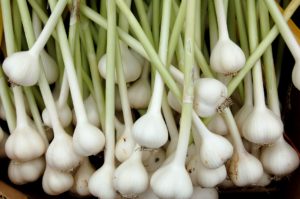Garlic is one of the most universally accepted culinary ingredients, appreciated around the world for its pungent flavor and its incredible versatility in complementing meat, vegetables, breads, and eggs. It is grown commercially all over the world, notably in China, where over 12 million tons are produced each year.
Provided below are guidelines to grow garlic in your garden.
Difficulty: Easy. Garlic is not suited for growing in containers. This can be done, but it’s better in the ground, or possibly in raised beds.
Timing: Plant cloves from September to the end of November. There is a brief window at the beginning of March when you can plant for a fall harvest, but in this climate garlic performs better if overwintered.
Sowing: Separate the cloves and set each one, pointed end up, 10-15cm (4-6”) apart and with the tip of the clove 2-5cm (1-2”) deep. Don’t skin the cloves! Use deeper planting if rain or frost may expose the cloves, and shallower planting if using mulch or planting into heavy soil. The largest cloves will make the largest bulbs.
Soil: Rich, well-drained soil. Dig well, add compost (lots of it if your soil is heavy) and do not compact it by stepping on it. Lime the soil several weeks before planting if the pH is lower than 6.0.
Growing: Fertilize when spring growth starts. Water as needed and keep weeded. Cut flower stalks to keep energy in the bulb. If individual cloves haven’t formed, either eat the clove or replant, and it will bulb next year.
Harvest: When the tops begin to dry, pull and air-dry like onions. Some growers recommend waiting until 75% of the plant has dried up before pulling, and others say the key is to pull when each plant is down to 6 green leaves.
Storage: Store in a cool, dry environment. Moisture and heat will provoke sprouting.
Pests & Disease: Many growers have been hit with White Rot that causes black spots and decay on the bulbs. It is easily spread in infected soil and water and is very persistent in the soil. Flooding the bed for 4 weeks in the spring may kill it. Best way to avoid it is not to leave decaying alliums in the ground and by using a strict 4-year rotation.
Companion Planting: Planting garlic near roses will help to repel aphids. Because of its sulfur compounds, it may also help repel whiteflies, Japanese beetles, root maggots, carrot rust fly, and other pests. Garlic, made into a tea, or spray, will act as a systemic pesticide, drawing up into the cells of the plants. It’s a good companion for beets, Brassicas, celery, lettuce, potatoes, strawberries, and tomatoes. Avoid planting it near peas or beans of any kind.
Excerpted from West Coast Seeds.









Leave a Reply